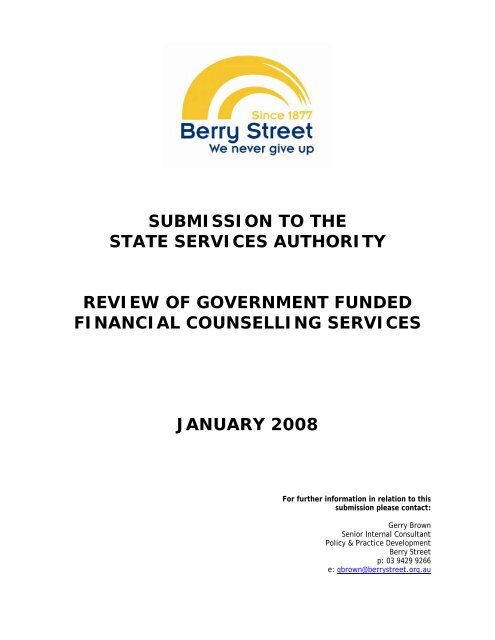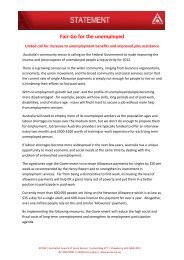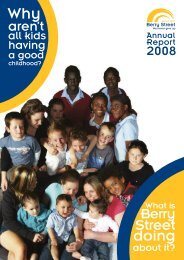Download submission - Berry Street
Download submission - Berry Street
Download submission - Berry Street
You also want an ePaper? Increase the reach of your titles
YUMPU automatically turns print PDFs into web optimized ePapers that Google loves.
SUBMISSION TO THE<br />
STATE SERVICES AUTHORITY<br />
REVIEW OF GOVERNMENT FUNDED<br />
FINANCIAL COUNSELLING SERVICES<br />
JANUARY 2008<br />
For further information in relation to this<br />
<strong>submission</strong> please contact:<br />
Gerry Brown<br />
Senior Internal Consultant<br />
Policy & Practice Development<br />
<strong>Berry</strong> <strong>Street</strong><br />
p: 03 9429 9266<br />
e: gbrown@berrystreet.org.au
Profile of <strong>Berry</strong> <strong>Street</strong><br />
Since 1877, <strong>Berry</strong> <strong>Street</strong> has been providing services to Victoria’s vulnerable children, young<br />
people and families. Incorporated under the Associations Incorporation (Amendment) Act 1997<br />
with a voluntary Board of Directors, <strong>Berry</strong> <strong>Street</strong> is now the largest independent child and family<br />
welfare organisation in Victoria.<br />
<strong>Berry</strong> <strong>Street</strong> provides a range of services for children, young people and families in a number of<br />
different locations. Services include: home-based care; residential and reception care services;<br />
intensive youth services, including youth support, outreach, employment and housing services;<br />
child abuse prevention programs; mediation and family counselling; education & employment<br />
programs and a school; family violence work & networking; domestic violence outreach; financial<br />
literacy and counselling programs; adoption & origins information; a publicity and recruitment<br />
unit for volunteer caregivers; a children’s contact service; a sexual abuse prevention program;<br />
community development and support programs and a Statewide intensive therapeutic service for<br />
children and young people (Take Two).<br />
<strong>Berry</strong> <strong>Street</strong> works across Victoria, from 19 offices and another 35 worksites, with the majority of<br />
services in the Gippsland, Hume, Northern and Southern regions. <strong>Berry</strong> <strong>Street</strong> employs approx.<br />
385 (EFT) staff and has the support of over 208 carer households and 419 volunteers. The budget<br />
for 2007/08 is more than $33 million.<br />
The <strong>Berry</strong> <strong>Street</strong> Strategic Plan for 2007-2010 outlines our current strategic objectives within the<br />
five key goal areas of: Services; People; Resources: Community; and Knowledge. The Plan<br />
reaffirms our commitment to deliver the highest quality services and to promote a learning culture<br />
to support the development of new service responses to identified and emerging needs.<br />
Financial literacy and counselling programs<br />
<strong>Berry</strong> <strong>Street</strong> Financial Counselling Service<br />
<strong>Berry</strong> <strong>Street</strong>’s Financial Counselling service is located in the Northern Metropolitan sub-region.<br />
<strong>Berry</strong> <strong>Street</strong> has a service agreement with the Department of Justice to provide the financial<br />
counselling service. The funding enables the employment of 1.75EFT financial counsellors<br />
(salary and salary on-costs only). No administrative support is funded. Counsellors are based at<br />
<strong>Berry</strong> <strong>Street</strong>’s Eltham office.<br />
The service has been operating for the past twenty years and is well established, used and<br />
respected, with good relationships with referring agencies, including Centrelink, local<br />
community and acute health services, General Practitioners, Churches, housing support services<br />
and other Government services. Open access sessions are held in local shopping centres and<br />
visits are made to other services such as hospitals and homelessness refuge. A federally funded<br />
emergency relief service is also provided by the same group of staff and brings in a wider group<br />
of more geographically dispersed users of the service.<br />
The service is both free and voluntary.<br />
The service works with a very diverse group of service users, a good proportion of whom suffer<br />
from significant vulnerabilities. Many have psychiatric problems and are referred from acute<br />
psychiatric hospital. The service has also received significant numbers of referrals from the<br />
refugee community. The majority of people using the service are reliant on Benefit payments<br />
and have a very low income.<br />
The service is currently meeting required performance standards with an initial phone<br />
assessment that is followed up within 5 days.<br />
The casework provided concentrates on the relief of current financial difficulties through<br />
advocacy, identifying the implications of different options involved (including payment plans<br />
STATE SERVICES AUTHORITY 2<br />
Review of government Funded Financial Counselling Services January 2008
and, where relevant, bankruptcy). These are relatively brief interventions to empower people<br />
to make decisions about their finances. Some additional work is also undertaken with people<br />
who require support with ongoing budgeting.<br />
As well as self and third party referrals, the service also provides support to clients engaged in a<br />
number of <strong>Berry</strong> <strong>Street</strong> programs in Northern Region, including Family Violence Services and<br />
Youth Services. In these cases the service is more focused on early intervention and education.<br />
The service does not work to strict geographical boundaries, but accepts referrals from people in<br />
need who are able to access the service. The service is working to capacity and in the 2006/07<br />
year, staff worked with 450 clients. As a result of the limited resources available in terms of<br />
staffing and time, increases in demand result in higher levels of prioritisation and a reluctance<br />
to advertise the service more widely.<br />
As a <strong>Berry</strong> <strong>Street</strong> service, staff are subject to all of <strong>Berry</strong> <strong>Street</strong>’s corporate standards including<br />
the values, equal opportunities, OH&S (including safe working environment), code of conduct<br />
and casework supervision.<br />
Despite a strong background in delivering financial services which are preventative and offer<br />
early intervention, <strong>Berry</strong> street has found that there are a wide range of situations that can lead<br />
to financial hardship for families, many of which cannot be prevented because of the structural<br />
roots of the problems.<br />
<strong>Berry</strong> <strong>Street</strong> Financial Literacy Programs (NOT Government funded)<br />
Saver Plus is a financial literacy and matched savings program that assists families on low<br />
incomes to improve their financial literacy, develop a savings habit and build assets for<br />
educational purposes. Participants' savings are matched $1 for $1 (up to $1,000) to help pay for<br />
their own or their children's education. Between 2006 and 2008 Saver Plus will be delivered to<br />
5,400 people in 18 communities across Victoria, New South Wales, Queensland and the ACT by<br />
<strong>Berry</strong> <strong>Street</strong>, The Smith Family, The Benevolent Society and the Brotherhood of St Laurence in<br />
partnership with the ANZ Bank.<br />
MoneyMinded is a financial education program developed to equip people with the knowledge<br />
and skills to successfully manage their day-to-day and longer-term financial matters.<br />
MoneyMinded enhances financial stability not only for individuals but, by extension, the broader<br />
community. The MoneyMinded program includes a diverse curriculum from simple personal<br />
issues to quite complex legal issues. It is approved by the Financial Literacy Foundation as a<br />
suitable financial literacy resource (see www.understandingmoney.gov.au).<br />
<strong>Berry</strong> <strong>Street</strong> provides a two-day, free, training package for community workers, volunteers,<br />
teachers, financial counsellors and carers. The training includes all resources required to<br />
facilitate MoneyMinded workshops.<br />
MoneyMinded recognises the importance of community educators and financial counsellors in<br />
reaching those in the community who can benefit from a better understanding of money and<br />
how it works. The program also highlights the long-term value of building sound financial<br />
knowledge. Every person's financial circumstances are unique, and as such, they require a<br />
different level of support and advice. MoneyMinded is flexible, enabling counsellors and<br />
participants to select workshops that relate to a participant's need and encourages more<br />
proactive consideration of their personal situation.<br />
Outcomes include:<br />
• More than 15,000 people have participated in MoneyMinded since 1 October 2005<br />
• 93% of participants recorded a positive change in the way they managed their money<br />
• At least 85% of participants completed the ‘Planning and Budgeting’ workshop<br />
• Facilitators report the program to be highly adaptable and user-friendly<br />
STATE SERVICES AUTHORITY 3<br />
Review of government Funded Financial Counselling Services January 2008
Question 1<br />
In what ways could financial counselling services balance casework<br />
responsibilities with effective preventive and early intervention activity?<br />
• What is the role of financial counselling service providers in prevention and early<br />
intervention?<br />
Whilst “early problem” and “crisis” interventions are both broadly delivered by individual<br />
casework, “pre-problem” interventions are best delivered in through community education. As<br />
identified, funding for this latter type of activity will always tend to be squeezed by the<br />
continual rise in referrals for casework. To fund preventive work effectively, the budget needs<br />
to be additional to the casework service (that is, not funded from the same, already small, pot<br />
of existing funding). Preventive work should be guided by plans that are devised locally to<br />
address the circumstances that are being identified through the casework service.<br />
Similarly, services will always struggle to provide early intervention casework when they need to<br />
prioritise people and families in crisis. To provide such an early intervention, services will need<br />
additional, ring fenced funding. This would enable services to improve their accessibility. To<br />
meet and categorise demand they will need clear, locally relevant guidelines on intake and<br />
triaging.<br />
• What forms of prevention and early intervention activity are most effective in alleviating<br />
potential problems?<br />
There are a series of structural issues that Governments, at State and Federal level, need to<br />
begin to tackle:<br />
• A more proactive approach is required from Government towards financial institutions<br />
with exorbitant rates of interest; many of which target those with least resources to pay.<br />
Such an approach should include both higher levels of regulation and publicity about the<br />
various credit traps into which vulnerable people can fall when searching for financial<br />
solutions.<br />
• Housing affordability is at the heart of many families’ inability to meet other financial<br />
commitments and Government needs to consider long-term solutions.<br />
• The Consumer Affairs Department should publicise bankruptcy as a positive solution to<br />
some chronic debt problems.<br />
• Where charges are payable for essential services (for instance in housing, education,<br />
health, child care, etc) the agency providing that service should be mandated to make<br />
available information, advice and individual support in relation to:<br />
• Ensuring that all relevant concessions are claimed;<br />
• Providing interest-free, staged payment opportunities; and<br />
• Providing information on further sources of advice for people who are unable to meet<br />
charges.<br />
• Advice needs to be universally available and delivered in a non-stigmatising manner (see<br />
below)<br />
• Credit Unions and Friendly Societies with socially responsible saving and lending profiles<br />
need to be encouraged by Government.<br />
Programs such as MoneyMinded have excellent outcomes, but long-term success of such<br />
programs is limited in the face of structural poverty. Saver Plus is an excellent model in that it<br />
rewards participants financially for prudent behaviour, but again, saving, at however minimal a<br />
rate, is a luxury for many of the poorest families.<br />
STATE SERVICES AUTHORITY 4<br />
Review of government Funded Financial Counselling Services January 2008
• How can service providers identify client groups who might benefit from prevention and<br />
early intervention activities?<br />
Programs such as MoneyMinded provide basic financial literacy and are usefully available<br />
universally. The community development and capacity building aspects of the program are<br />
central to its success.<br />
The introduction of practical financial management curriculum in the final years of secondary<br />
education would provide some universal coverage.<br />
<strong>Berry</strong> <strong>Street</strong> currently provides support to people who are, or are at risk of becoming financially<br />
vulnerable, including care leavers, women escaping family violence, youth services and people<br />
from culturally and linguistically diverse backgrounds and would welcome the funding to widen<br />
our support of these vulnerable groups in our community.<br />
• How can other social services and other agencies contribute to preventing and minimising the<br />
impact of emerging financial hardship and debt-related problems?<br />
Financial Counselling Services have considerable experience and skills in supporting people in<br />
financial crisis and their skills are best used in this field. Specialist financial counselling services<br />
could usefully be funded to provide training to generalist caseworkers, social workers and<br />
support workers from a variety of social service agencies to enable a basic level of financial<br />
advice and support to be provided by multiple services. This would enable financial counselling<br />
to be offered on a more targeted basis.<br />
• How service providers overcome impediments, such as feelings of shame or embarrassment,<br />
to encourage people who seek assistance before reaching a crisis point?<br />
Transparency and universality are key to reducing stigma. Increasing the availability and range<br />
of not for profit financial services will, over time, reduce the stigma of seeking assistance. At<br />
present, <strong>Berry</strong> <strong>Street</strong>’s financial counselling service is unable to advertise as widely as it would<br />
like in order to keep referrals to manageable proportions. The service thus remains inherently<br />
stigmatising; as a service of last resort. Increased levels of funding would enable the service to<br />
become more visible, accessible and less viewed within the community as a service for the<br />
desperate.<br />
Question 2:<br />
In what ways and at what stages in the recovery process could financial<br />
counselling services most effectively respond to the needs of communities in<br />
crisis?<br />
• What type of financial support is required for communities in crisis (eg information about<br />
payments and grants, budgeting assistance, advocacy, etc)?<br />
Communities in crisis will usually have a normal profile of financial literacy. Many will be<br />
financially literate and will require only information, encouragement to apply for grants (a rights<br />
based rather than a charitable approach is key to reducing stigma) and support with advocacy<br />
(particularly with insurance companies).<br />
Other members of the community will have existing (often entrenched) financial problems that<br />
have been exacerbated by the crisis. This group requires individual financial counselling.<br />
The number of specialist financial counsellors is limited and whilst the first group’s needs may<br />
be met by non-specialist services, the needs of the second group are currently required to be<br />
absorbed by already overstretched services. Solutions include increasing the pool of trained<br />
counsellors and training of volunteer counsellors (to operate with the support and supervision of<br />
a smaller number of specialist financial counsellors).<br />
STATE SERVICES AUTHORITY 5<br />
Review of government Funded Financial Counselling Services January 2008
• What are the short and medium term impacts of an emergency on households’ financial<br />
status?<br />
This crucially depends upon whether the emergency has permanently affected the family’s<br />
ability to earn an income and on whether adequate levels of insurance were in place prior to the<br />
emergency.<br />
<strong>Berry</strong> <strong>Street</strong>’s financial counselling service is increasingly being accessed by very small (usually<br />
family based) businesses. Such businesses are less likely to have appropriate levels of insurance<br />
to cover unforeseen losses either due to loss of work or damage to or loss of equipment.<br />
Adequate insurance is often the first casualty of a struggling business, which leaves them<br />
particularly vulnerable to crises.<br />
Families left without an income stream or adequate insurance require medium to long term<br />
(specialist) financial counselling, including impartial advice on realisation of remaining assets.<br />
• Does demand for financial counselling services increase following an emergency and do<br />
providers have capacity to meet extra demand?<br />
<strong>Berry</strong> <strong>Street</strong>’s Financial Counselling Service’s experience is that the effect of the drought is of a<br />
primarily long term nature. Reduced family incomes greatly increase the risk of household food<br />
insecurity and transport difficulties resulting in greater social isolation. These longer term<br />
impacts also serve to reduce individual and community resilience to emergencies, increasing the<br />
likelihood that following an emergency, more specialist services will be required. The need for<br />
financial counselling has indeed increased, although demand is affected by accessibility, both in<br />
terms of geography and in relation to the overcoming the stigma attached to asking for help.<br />
<strong>Berry</strong> <strong>Street</strong> would be committed to helping in an emergency situation, but is already fully<br />
committed in existing work. The training of additional counsellors (paid or volunteer) takes time<br />
and capacity needs to be increased, both to address existing demand and to enable some<br />
capacity for emergency counselling.<br />
• How might the needs of individuals, families and households following an emergency differ<br />
from those who are experiencing financial hardship as a result of other circumstances (eg<br />
illness, injury or the end of an intimate relationship, etc)?<br />
The needs of a community in crisis are an acute reflection of the needs of communities in<br />
general. Crisis exacerbates and makes more obvious existing problems that a family may have<br />
previously kept to themselves. Families who are financially stable are able to prioritise<br />
adequate levels of insurance and, generally, will recover from crises relatively quickly with<br />
information and support.<br />
The communities that are worst hit are those that are already experiencing financial stress such<br />
as areas that have lost industries and jobs or communities that have suffered cumulative stress<br />
because of rurality, rising fuel prices and drought.<br />
Question 3:<br />
What are the options for improving service integration in the financial<br />
counselling service model?<br />
• How does service integration currently operate at the local level?<br />
The <strong>Berry</strong> <strong>Street</strong> Financial Counselling Service is well integrated both into the suite of other<br />
<strong>Berry</strong> <strong>Street</strong> services (especially family violence and youth support services) and in the service<br />
system in general from where it receives a high proportion of its referrals.<br />
• What types of agencies are most relevant to financial counselling services (eg health<br />
services, legal advice, housing support, consumer advocacy, etc)?<br />
STATE SERVICES AUTHORITY 6<br />
Review of government Funded Financial Counselling Services January 2008
Referrals to the <strong>Berry</strong> <strong>Street</strong> service are received from all of the above services and, in turn, the<br />
Financial Counselling Service is well placed to refer the people it works with back into free or<br />
low cost services.<br />
• What are the constraints on more integrated service delivery?<br />
One of the principle constraints is of the fragmented and dispersed nature of the service system,<br />
each element covering different aspects of need and geographic areas. Other constraints<br />
include the lack of availability of key services such as specialist legal advice (free at the point of<br />
use) in many localities.<br />
Many people who request help from financial counselling services feel their lives are out of<br />
control. One of the roles of counsellors is to help them regain control and this includes<br />
encouraging people to self-refer on to other services wherever possible to reduce the sense of<br />
dependence on the counselling service. However, fast tracking of referrals of people in crisis<br />
both to and from the financial counselling service is important and usually relies upon local<br />
knowledge and the quality of established relationships between services built up by local staff.<br />
• What kind of systems or tools could facilitate service integration?<br />
There is a limit to the usefulness of formal tools in this area of work. Good communication is<br />
key to building the necessary knowledge of and trust between professionals. This is built up<br />
through:<br />
• Having secure funding for the service to encourage staff stability;<br />
• Funding financial counselling staff to have a role in leading communication with and<br />
providing training opportunities for local casework staff from a large range of agencies;<br />
• Funding local networks to bring together a range of community groups and agencies in an<br />
area to share information and prioritise resources in relation to financial counselling.<br />
STATE SERVICES AUTHORITY 7<br />
Review of government Funded Financial Counselling Services January 2008

















